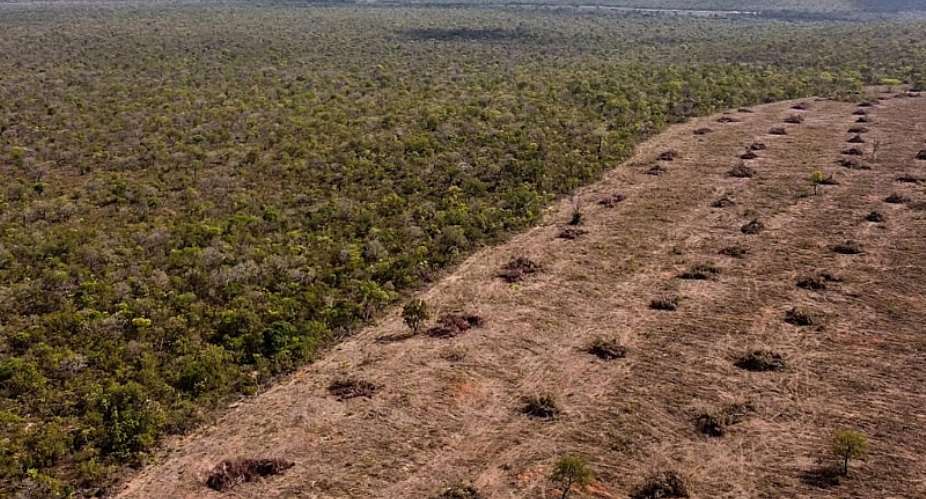Since the 2015 Paris climate agreement, European banks have lent about €256 billion to corporations that put forests, savannahs and other natural ecosystems at risk, according to new research by a collective of NGOs, including Greepeace.
More than 130 key actors in ecosystem risk sectors have received more than one-fifth of their total global credit since the 2015 Paris Agreement, and just under one-tenth of their current global investment, from EU-based financial institutions, according to the report published on Tuesday.
Entitled "Bankrolling Ecosystem Destruction: The EU must stop the cash flow to businesses destroying nature" the study uses data from Profundo, an independent research organisation.
It focuses on JBS, Cargill, Sinar Mas and other top global producers, processors and traders of soy, cattle, palm oil, rubber, timber and other commodities that contribute to the destruction of local ecosystems.
Currently, the EU comes second only to the US for funding these sectors.
Ecosystems are key towards slowing down climate change, and harming them could also be detrimental to global climate goals.
Putting nature at risk
The report names ABN Amro Bank, Santander, BNP Paribas, ING Group, Deutsche Bank, Allianz Group, Credit Agricole, Group BPCE, Societe Generale, DZ Bank Group, Rabobank and Nordea Bank as the banks that have been funding sectors and companies putting nature at risk.
These banks accounted for about 22 percent of the entire worldwide credit given to large companies in the above sectors between 2016 and early 2023.
Approximately 86 percent of this credit came from banks in Germany, Spain, France and the Netherlands.
Recently, the EU has been doing more to lessen its share in global deforestation and hold itself more accountable when it comes to ecosystem destruction, by implementing the EU Deforestation Regulation (EUDR), which obliges corporations to sell only legally produced and deforestation-free products in the EU.
"Under the regulation, any operator or trader who places these commodities on the EU market, or exports from it, must be able to prove that the products do not originate from recently deforested land or have contributed to forest degradation," the European Commission said on 29 June 2023.
But the EU has come under considerable fire for failing to hold the financial sector to account when it comes to funding these companies and sectors.
“Europe thinks highly of itself for climate and nature protection, but looks the other way as its banks pour money into companies linked to massive nature destruction and related human rights abuses," says Sigrid Deters, biodiversity campaigner at Greenpeace Netherlands.
Review in 2025
The European Commission is expected to review the role of finance in deforestation and forest degradation and, if necessary, make a legislative proposal by June 2025.
One area of the globe that has particularly suffered from ecosystem destruction is Brazil.
Although the EU law banning deforestation-derived products will into effect at the end of 2024, Brazilian Indigenous people say it contains a loophole: the Cerrado, Brazil's vast wooded savanna, is excluded from its scope.
The definition of "forest" in the text does not cover the Cerrado, which extends through central Brazil and into neighbouring Paraguay and Bolivia.
Isabel Figueiredo of the Brazilian NGO ISPN (Instituto Sociedade, Populacao e Natureza) told French news agency AFP that "half of the Cerrado has already disappeared," its prairies and woods giving way to farms turning out soy or other crops."
An Indigenous delegation taking up the issue during a visit to Brussels this week said that the oversight is "a question of survival" for them.
Much of the soy imported into Europe comes from that zone, and deforestation within it jumped 43 percent last year.
"The Cerrado is not protected by Brazilian laws – most of the Brazilian laws are looking at the Amazon," said Giulia Bondi, of the NGO Global Witness.
The Greenpeace report suggests that EU needs to put its efforts in directing money flows to support restoration of ecosystems and struggling farmers to transition towards more resilient and ecological farming.





 Let’s be true believers, not just church goers – Catholic Priest to Christians
Let’s be true believers, not just church goers – Catholic Priest to Christians
 Ejisu by-election: "We don’t need an independent candidate" — Akufo-Addo fights ...
Ejisu by-election: "We don’t need an independent candidate" — Akufo-Addo fights ...
 Election 2024: Bawumia dares Mahama to two-man debate as he starts countrywide t...
Election 2024: Bawumia dares Mahama to two-man debate as he starts countrywide t...
 'Borla' BVDs: 'Why would anyone want to buy 10 used biometric devices 'hard-code...
'Borla' BVDs: 'Why would anyone want to buy 10 used biometric devices 'hard-code...
 Professor Jane Naana pays last respect to Modestus Ahiable
Professor Jane Naana pays last respect to Modestus Ahiable
 IT is a major skill needed for the job market - Industry Players
IT is a major skill needed for the job market - Industry Players
 Nungua Traditional Council performs “Jenten Nishwamo” ahead of Homowo
Nungua Traditional Council performs “Jenten Nishwamo” ahead of Homowo
 Tema residents demand end of dumsor
Tema residents demand end of dumsor
 A vote for Owusu Aduomi is a vote gor NDC – Bawumia tells Ejisu residents
A vote for Owusu Aduomi is a vote gor NDC – Bawumia tells Ejisu residents
 S. Africa's ex-president Zuma makes surprise comeback
S. Africa's ex-president Zuma makes surprise comeback
